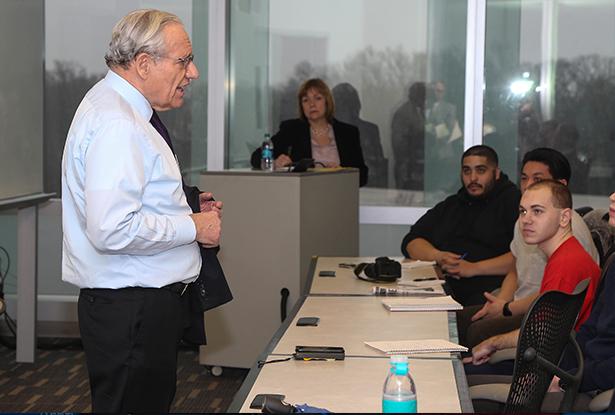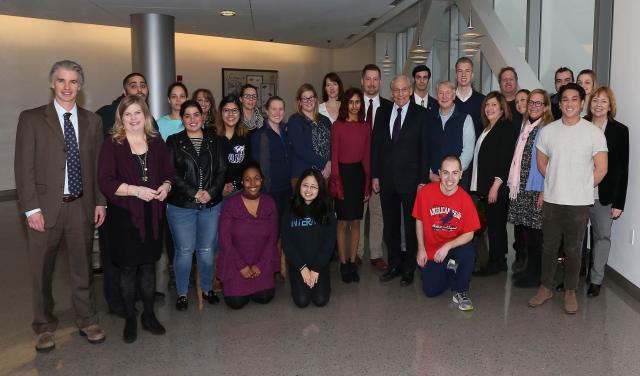Insight from an Icon in Journalism

Pulitzer Prize winner Bob Woodward shared personal recollections of the Watergate scandal and his more than 40 years as a journalist covering presidents and other titans of government as the inaugural speaker for Kean University’s new Distinguished Lecture Series.
To nearly 500 people in Kean’s STEM Building auditorium and watching via livestream on the building’s sixth floor, Woodward said the United States is at a pivot point.
“Where our politics take us clearly is unknown, but the Trump era is going down in the history books,” he said.
The lecture series is designed to engage Kean’s students, faculty and staff, and the surrounding community, in a dialogue about democracy.
“This series brings in people of distinction – people who know the pulse of America – to talk to our students and community,” said Dawood Farahi, Ph.D., Kean’s president. “It is an obligation for a public university to make sure that we talk about these issues, to get educated about them and to learn how to change America for the better.
Woodward, the author of 18 national best-selling books, including All the President’s Men about the Watergate break-in and cover-up, said presidents suffer from a common disease – isolation. He argued that self-discipline, a belief system, and the ability to define and plan “the next stage of good for a majority of the people in the country” are needed to restrain presidential power.
“Any relationship — it gets down to a compromise. This is the kind of leadership that is called for at this moment, and we find that divisions, rather than being healed, are amplified,” he said.
An associate editor at The Washington Post, Woodward also talked about the challenges in journalism today, in particular, the impatience of the internet age, with its ever-evolving news cycles.
“When Carl Bernstein and I worked on Watergate stories, sometimes we would work for two or three weeks on one story,” he said. “Now, reporters literally have to do five or six versions of a story in 24 hours.”
That theme was underscored earlier in the day when Woodward met with a class of Kean communication and history students. He urged them to stop using phones and email to chase down stories, and to seek out original sources.
“If you want to find out something that is going on, you go to a human being who is a witness or has information or has opinions,” he said. “Go to the scene. Look for yourself.”

Joshua Rosario, a communication major, was grateful for the advice from an American icon.
“As a student journalist, it is like meeting the Beatles, or a rap music fan meeting Jay-Z,” he said.
Honors History student Caleb Dagnall saw Woodward’s lecture as an important civics lesson.
“It was great to hear his insight,” he said. “We are here to learn how to be a citizen, how to be a member of a society.”
Throughout his more than four hours on Kean’s campus, which ended with a reception and book signing of All the President’s Men at Ursino Steakhouse & Tavern adjacent to the STEM Building, Woodward fascinated his audiences with personal stories about presidents.
On President Richard Nixon: “He used the presidency as an instrument of personal revenge.”
On President Gerald Ford: “Gerald Ford turned out to be one of the most open, strongest possible truth tellers, as much as you can be a truth teller in politics, that I had met.”
On a 2016 interview with then presidential candidate Donald Trump: “This is what Trump said, ‘Real power is fear.’ As much as anything I know, that is the Trump approach to people. Scare people. Leverage fear as much as you can.”
Woodward cautioned the audience to keep an open mind and for journalists to remain objective.
“Our job is not to loathe or love. Somehow we’ve got to bleach that out. Our job is to explain and understand,” he said.
Additional speakers for the lecture series will be announced in the coming weeks.